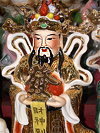|
Cai Shen (财神)
Chinese.
‘Wealth god’, ‘money spirit’ or ‘mammon’. There are numerous distinct
Chinese wealth gods, differentiating between formal and informal, as
well as civilian and military wealth deities, with the most influential
and popular one being the military god
Zhao Gong Ming (fig.). Among the civilian wealth deities are
Fan Li
and
Bi Gan
(fig.), while another warrior god of wealth is
Kuan U.
The informal wealth gods include
Wu Lu Cai Shen; the
Smiling Buddha
who is also known as
Budai;
Fu,
one of the
Three Star Gods;
Li Shi Xian Guan;
Liu Hai,
the god associated with the three-legged
Lucky Money Toad
Chanchu,
etc. Sometimes transcribed Tsai Shen or Chai Shen.
Chinese wealth gods are typically portrayed in royal
dress, usually holding attributes related to riches and power, such as
Chinese gold ingots
(fig.),
a
ruyi (fig.),
fang kong qian
coins
(fig.),
a banner with a promotional wealth text, etc.
In
Thai-Tae Chew known as
Chai Sing,
and he may sometimes be called
Tsai Shen Yeh
(fig.)
or Cai Shen Ye (fig.).
In
Vietnam,
he is called
Than Tai (fig.)
and typically one of two deities placed in small Vietnamese home altars,
the other deity being
Tu Di Gong,
the Chinese Lord of the Soil and the Ground, who in Vietnamese is known
as
Tho Cong (fig.),
among several other names.
See also
Jambhala,
Luang Pho Sethi Nawakoht,
Kubera,
and
mongoose.
回






|

